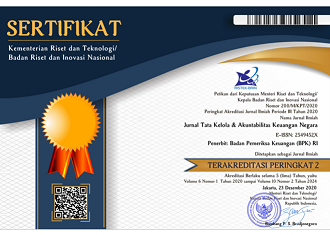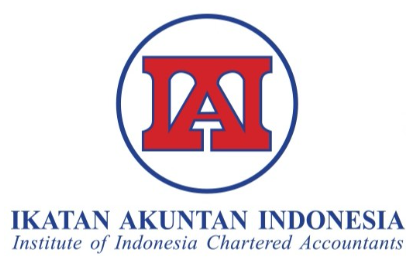The Strategy to Optimize the Role of Government Internal Supervisory Apparatus (APIP) in Procurement Fraud Risk Management in Industry 4.0
DOI:
https://doi.org/10.28986/jtaken.v7i2.588Keywords:
Fraud risk, procurement, internal auditor, data analytics, risk assessmentAbstract
Many challenges confront the efforts to build procurement fraud risk management in Industry 4.0. This study aims to assess the risk of procurement fraud in industry 4.0 and disclose strategies to optimize the role of internal auditors in mitigating these risks. The mixed-method has been conducted with data on procurement fraud risks generally accepted by government agencies. A survey involving 140 respondents and interviews with five experts have been completed. The risk assessment in the research findings involved seven procurement fraud risks, with "collusion between providers in e-tendering" ranking the highest. Procurement management must detect and prevent fraud by creating anti-hacker applications, conducting data analytics on business ownership, and ongoing monitoring. Internal auditors must undertake fraud prevention by improving their ability in data analytics, encouraging probity plans, and procurement assistance. Fraud detection is carried out through performance audits using computer-assisted audit techniques, probity audits, information technology governance audits, continuous audits, data analytics, and internal auditor integrity assessments through surveys to the auditee.
References
Abdalla, M. M., Oliveira, L. G. L., Azevedo, C. E. F., & Gonzalez, R. K. (2018). Quality in qualitative organizational research: Types of triangulation as a methodological alternative. Administração: Ensino e Pesquisa, 19(1), 66-98. DOI: 10.13058/raep.2018.v19n1.578
ACFE. (2017). Survai fraud Indonesia. Jakarta: Association of Certified Fraud Examiners (ACFE) Indonesia Chapter. Retrieved from http://acfe-indonesia.or.id/wp-content/uploads/2017/07/SURVAI-FRAUD-INDONESIA-2016.pdf
ACFE. (2020). Report to the nations; 2020 global study occupational fraud and abuse. Jakarta: ACFE Indonesia Chapter. Retrieved from https://www.acfe.com/report-to-the-nations/2020/
Alfian. (2015). Pemetaan jenis dan risiko kecurangan dalam audit pengadaan barang dan jasa. Jurnal Pengadaan, 4(1), 1–19.
Anderson, U. L., Head, M. J., Ramamoorti, S., Riddle, C., Salamasick, M., & Sobel, P. J. (2017). Internal auditing: Assurance & advisory services. (4th ed.). Lake Mary, FL: The IIA Research Foundation.
Arikunto, S. (2014). Prosedur penelitian: Suatu pendekatan praktik. Jakarta: PT Rineka Cipta.
Asad, A. F., Tarjo., & Musyarofah, S. (2019). Reorientasi audit internal untuk melawan korupsi pengadaan. Jurnal Akuntansi Multiparadigma, 10(3), 583–601. DOI: 10.21776/ub.jamal.2019.10.3.34
Bachri, B. (2010). Meyakinkan validitas data melalui triangulasi pada penelitian kualitatif. Jurnal Teknologi Pendidikan, 10(1), 46–62.
BPKP. (2010). Konsep dan implementasi risk assessment, modul diklat Sistem Pengendalian Intern Pemerintah (SPIP) dasar. Jakarta: Pusdiklatwas BPKP.
BPKP. (2016). Laporan hasil kajian efektivitas pembinaan BPKP terhadap maturitas SPIP pemerintah daerah. Jakarta: Pusdiklatwas BPKP.
Didi, D., & Kusuma, I. C. (2018). Faktor-faktor yang berpengaruh terhadap kecenderungan kecurangan (fraud): Persepsi pegawai pemerintahan daerah Kota Bogor. Jurnal Akuntansi Dan Keuangan Indonesia, 15(1). DOI: 10.21002/jaki.2018.01
Elim, J. (2019). Determinan implementasi IACM di lingkungan APIP (Makalah Dalam Rangka Sertifikasi Qualified Internal Audit (QIA)).
Free, C. (2015). Looking through the fraud triangle: A review and call for new directions. Meditari Accountancy Research, 23(2), 175–196. DOI: 10.1108/MEDAR-02-2015-0009
Government Regulation Number 60 of 2008 concerning Government Internal Control System (Peraturan Pemerintah Nomor 60 Tahun 2008 tentang Sistem Pengendalian Intern Pemerintah). Retrieved from http://www.bpkp.go.id/public/upload/unit/perekonomian/files/PP%20No%2060%20Tahun%202008.pdf
Hussaini, U., & Bakar, A. A. (2017). Fraud risk management. MARIM RiskNews, 1.
Jackson, P. (2013). Debate: Fraud risk management in the public sector. Public Money & Management, 33(1). DOI: 10.1080/09540962.2013.744866
Kamal, M. (2019). Peta risiko fraud pengadaan. Jurnal Transformasi Administrasi, 9(2), 139–163.
Kamal, M. (2020). Peta risiko manajemen pemerintah. Jurnal Pengawasan, 2(1), 22-40.
Kamal, M., & Elim, J. (2018). Good governance strategy at Indonesian government procurement in the disruptive era: A retrospective case study. Paper presented at The 2nd International Conference on Administrative Science, Policy, and Governance Studies (ICAS PGS) 2018, Jakarta, Indonesia.
Kamal, M., & Nasarudin. (2020). The government’s internal audit planning strategy in preventing corruption in the procurement sector in the era of disruption. Asia Pacific Fraud Journal, 5(1), 11-23. DOI: 10.21532/apfjournal.v5i1.132
Kassem, R., & Higson, A. (2012). The new fraud triangle model. Journal of Emerging Trends in Economics and Management Sciences (JETEMS), 3(3), 191–195.
KPK. (2019). TPK berdasarkan jenis perkara. Retrieved from https://acch.kpk.go.id/id/statistik/tindak-pidana-korupsi/tpk-berdasarkan-jenis-perkara
Li, H., Dai, J., Gershberg, T., & Vasarhelyi, M. A. (2018). Understanding usage and value of audit analytics for internal auditors: An organizational approach. International Journal of Accounting Information Systems, 28, 59–76. DOI: 10.1016/j.accinf.2017.12.005.
Mackevičius, J., & Giriūnas, L. (2013). Transformational research of the fraud triangle. Ekonomika, 92(4). DOI: 10.15388/Ekon.2013.0.2336.
Minister of Finance Regulation Number 12 of 2016 concerning Implementation of Risk Management in The Ministry of Finance (Peraturan Menteri Keuangan Republik Indonesia No. 12 Tahun 2016/PMK No.12/2016). Retrieved from https://jdih.kemenkeu.go.id/fulltext/2016/12~PMK.09~2016Per.pdf
Mohd-Nassir, M., Mohd-Sanusi, Z., & Ghani, E. (2016). Effect of brainstorming and expertise on fraud risk assessment. International Journal of Economics and Financial Issues, 6(S4), 62-67.
Muniroh, S. D., & Kamal, U. (2018). The Indication of unfair business competition practice in the implementation of public procurement auction using e-tendering. Journal of Private and Commercial Law, 2(2), 78-93. DOI: 10.15294/jpcl.v2i2.15700
Panuntun, D. J. S. (2020). Auditor internal pemerintah di era digital. Jurnal Pengawasan, 2(1), 1-7.
Presidential Regulation Number 16 of 2018 concerning Procurement of Public Goods and Services (Peraturan Presiden Nomor 16 Tahun 2018 tentang Pengadaan Barang/Jasa Pemerintah). Retrieved from https://jdih.lkpp.go.id/regulation/peraturan-presiden/peraturan-presiden-nomor-16-tahun-2018
Purnomo, B. H. (2017). The role of internal audit in governance, risk management, and controls for fraud prevention at PPATK. Asia Pacific Fraud Journal, 2(1). DOI: 10.21532/apfj.001.17.02.01.02
Rieneke, S. (2017). The discursive construction of corruption risk. Journal of Management Inquiry, 26(4), 366-382. DOI: 10.1177/1056492616686839
Rilyani, A. N., Firdaus, Y. A. W., & Jatmiko, D. D. (2015). Information technology risk analysis based on risk management using Iso 31000 (Case study: i-Gracias Telkom University). E-Proceeding of Engineering, 2(2), 6201-6208. Retrieved from https://openlibrary.telkomuniversity.ac.id/home/epublication/id/44.html
Subagio. (2016). Identify the main factors that influence corruption and suggest how to eradicate the corruption problem in Indonesia. Asia Pacific Fraud Journal, 1(1), 37-48. DOI: 10.21532/apfj.001.16.01.01.03
Vona, L. W. (2008). Fraud risk assessment: Building a fraud audit program. John Wiley & Sons, Inc.
Weyers, M., Strydom, H., & Huisamen, A. (2008). Triangulation in social work research: The theory and examples of its practical application. Social Work, 44(2), 207–222. DOI: 10.15270/44-2-251
Wibowo, T. (2020). Audit 4.0: Perspektif baru teknik audit di era digital. Jakarta: Universitas Indonesia Publishing.
Downloads
Submitted
Accepted
Published
How to Cite
Issue
Section
License

Jurnal Tata Kelola dan Akuntabilitas Keuangan Negara is licensed under
a Creative Commons Attribution-ShareAlike 4.0 International License




















